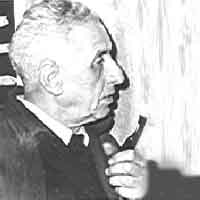Born in Warsaw, Natan Alterman moved to Tel Aviv in 1925 and was a student at the Herzliya Gymnasia. He went to France to study agronomy, but upon his return to Eretz Yisrael he devoted himself to a career of writing. Although known primarily as a poet, Alterman’s literary talents extended to other genres as well. He wrote plays, theatrical sketches, and children’s literature, and was a distinguished translator, translating works by Shakespeare, Moliere, and Racine into Hebrew. Alterman received many prizes for his translation work, and in 1968 he was awarded the Israel Prize for his contribution to Hebrew Literature.
Alterman’s poetry, which he began publishing in 1931, can be divided into two major categories. The first is his contemporary political poetry, much of which emerged in his weekly newspaper columns, beginning in 1934 in Ha’aretz, and from 1943 in Davar. This work confronts bluntly, and often harshly or satirically, the issues facing Israeli society, first in the Yishuv and then in the independent state. Considered the poet of the Yishuv and the literary spokesman of the nationalist movement, he expressed the people’s longing for independence; indeed, some of his lyrics, censored by the British, became anthems of the contemporary struggle. Following 1948, Alterman tackled in his work key social and political issues facing the country, and in the aftermath of the Six Day War became a proponent of the Greater Land of Israel ideology.
The other main dimension of Alterman’s poetry is his lyrical, meditative work. Influenced by French and Russian symbolist poets, he became himself a leading imagist poet and was an important model in the emergence of a modern, indigenous Hebrew poetry. Deft with uses of language and rhythm, Alterman created a canon of verse rich in images and variations in prosody. Chapters of Jewish history, particularly the Holocaust, find expression in this work, as well as the conflict between natural, pristine forces that represent a lost Eden against the influences of the urbanized, mechanized contemporary world. His love poetry as well reflects the tension between women who portray these opposing impulses.
Alterman’s first book of poetry, Kohavim BaHutz (“Outdoor Stars”) was published in 1938. Subsequent editions of poetry, including Shirei Makkot Mitzrayim (“Plagues of Egypt,” 1944) appeared in the 1940’s and 1950’s. His collected works were published in four volumes in 1961-62.


12 thoughts on “Kaminos”
Was Nicholas related to Alexander Saslavsky who married Celeste Izolee Todd?
Anyone have a contact email for Yair Klinger or link to score for Ha-Bayta?
wish to have homeland concert video played on the big screen throughout North America.
can organize here in Santa Barbara California.
contacts for this needed and any ideas or suggestions welcomed.
Nat farber is my great grandpa 😊
Are there any movies or photos of max kletter? His wife’s sister was my stepmother, so I’m interested in seeing them and sharing them with his wife’s daughter.
The article says Sheb recorded his last song just 4 days before he died, but does not tell us the name of it. I be curious what it was. I’d like to hear it.
Would anyone happen to know where I can find a copy of the sheet music for a Gil Aldema Choral (SATB) arrangement for Naomi Shemer’s “Sheleg Al Iri”. (Snow on my Village)?
Joseph Smith
Kol Ram Community Choir, NYC
Shalom Joseph. I just saw your 2024 post by chance… I’m a mostly-retired Israeli journalist and translator. In 2003 I translated into English the content (the objective was to remain true to the meaning, not to cadence or rhyme) of poems and lyrics of 48 of Israel’s most iconic songs arranged by Aldema for choirs abroad singing in Hebrew (the words in the scores are transliterated) but members of the choir lack mastery of Hebrew to ‘know’ exactly what they are saying/singing… The book was titled in English “A Merry Choir” – in Hebrew מקהלה עליזה . See if you can find a copy in a used book store, it is priceless and apparently out-of-print – well worth the search. If not, they may have a copy at Tel Aviv Amenu Museum’s music department – write them and see if they can send it to you. Or – if you will contact me via Whatsapp – (972) 546872768 or via my email – I will try and find the book (it is not where it ‘should be’ so I have to search) and I will photograph the score with my cell and send to you as an attachment. Best, Daniella Ashkenazy – Kfar Warburg.
שלום שמעון!
לא שכחתי אותך. עזבתי את ישראל בפברואר 1998 כדי להביא את בני האוטיסט לקבל את העזרה המקצועית שלא הייתה קיימת אז בישראל. זה סיפור מאוד עצוב וטרגי, אבל אני הייתי היחיד עם ביצים שהביא אותו והייתי הורה יחיד בשבילו במשך חמישה חודשים. הוא היה אז בן 9. כעת הוא בן 36 ומתפקד באופן עצמאי. נתתי לו הזדמנות לעתיד נורמלי. בטח, אבות כולם חרא, אומרים הפמינציות, אבל כולם צריכים לעבוד כמטרות במטווחי רובה!
משה קונג
(Maurice King)
Thank you for this wonderful remembrance of Herman Zalis. My late father, Henry Wahrman, was one of his students. Note the correct spelling of his name for future reference. Thank you again for sharing this.
Tirza Wahrman (Mitlak)
amazing zchuso yagein aleinu, he wrote the famous niggun Lefichuch that is sung in almost every Israeli Yeshiva
My grandmother, Rose Ziperson, wrote the words to his music for a song called Main Shtetele, which he produced. I have the sheet music!